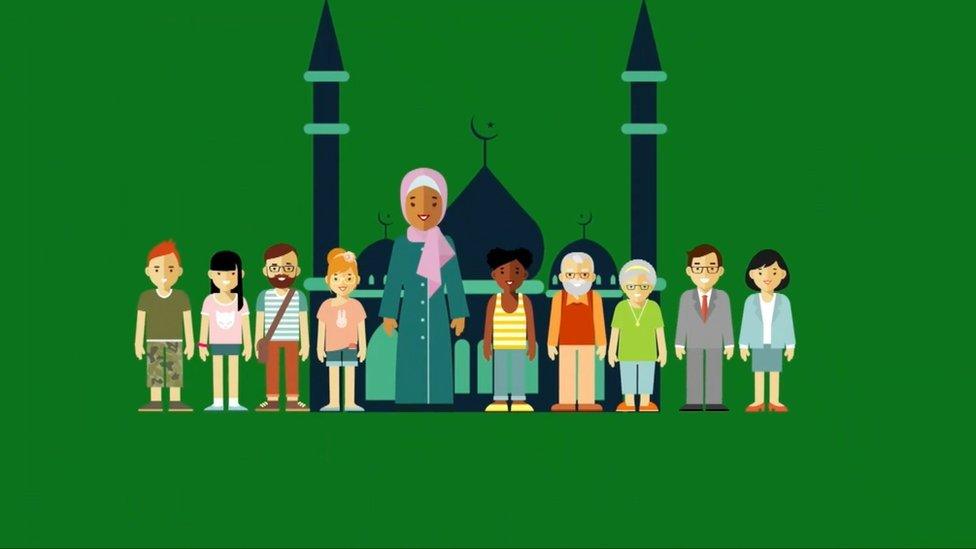Year of the Pig: Is it really a problem for Muslims?
- Published
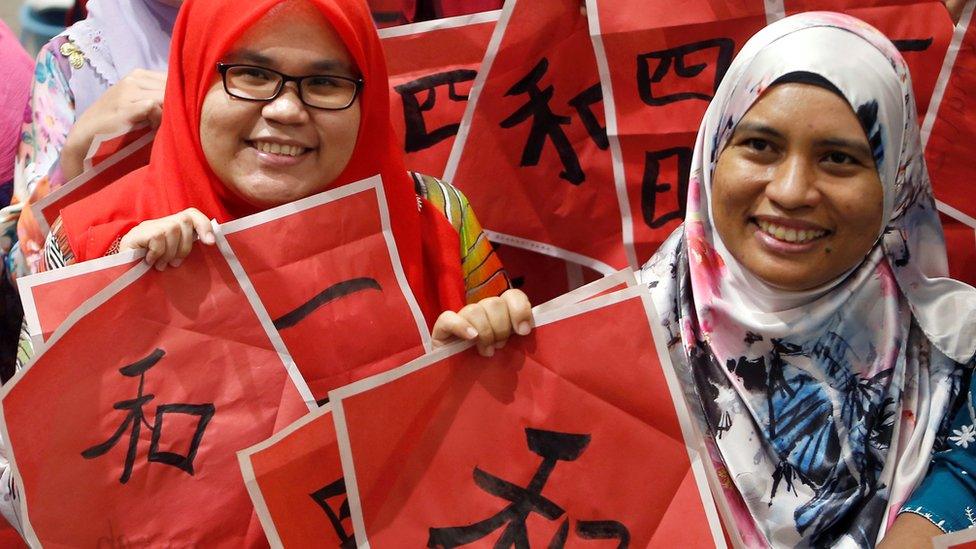
Muslim teachers attend a Chinese calligraphy event in Kuala Lumpur, Malaysia to mark the Year of the Pig
Communities around the world are gearing up to celebrate the lunar new year, which this time ushers in the Year of the Pig.
New Year celebrations usually mean the animal is depicted everywhere - in decorations, toys, gifts and advertising.
But the pig, the last animal on the Chinese zodiac calendar, is considered unclean by Muslims and a sin to consume. So does this cause problems for people celebrating lunar new year in Muslim-majority countries in South East Asia?
Like most Chinese-Malaysian families, the lunar new year is serious business for the Chow family, who live in the sleepy town of Batu Pahat in Johor, Malaysia.
This year is particularly significant because Chow Yoon Kee, his wife Stella and their daughter were all born in pig years.
"We will display lots of lucky pig ornaments at home and of course, have our relatives, friends, workers and neighbours over to visit, no matter what race or religion. Celebrations are for all," said Mr Chow, a floor manager at a local biscuit factory.
He isn't worried about his celebrations offending fellow residents as he believes there is no sign of new year controversy.
"There was a lot of fuss last year," he recalls, when it was the Year of the Dog, also seen as impure animals by some Muslims.
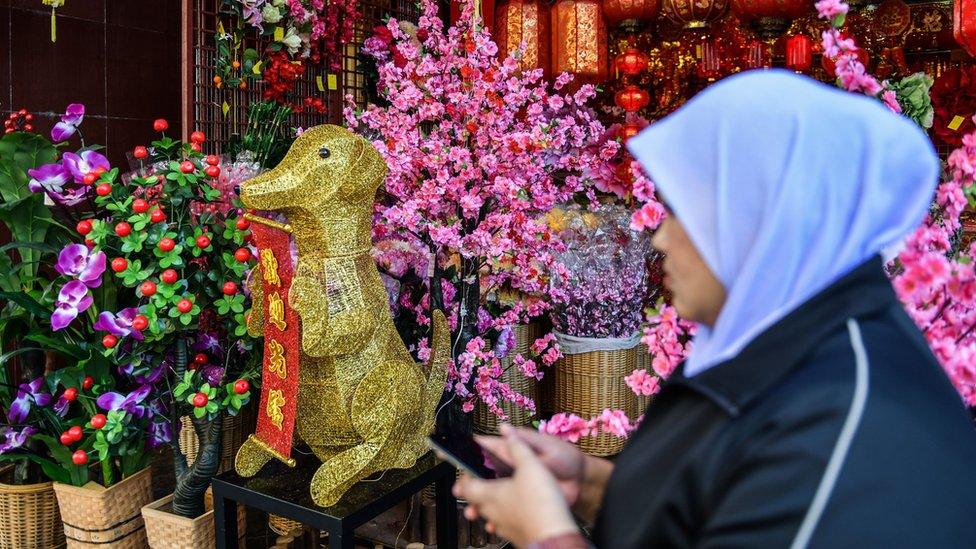
Malaysian authorities trod cautiously last year, being careful not to overdo the canine decorations
Malaysia is multicultural but the official religion is Islam, and there have been increasing reports of intolerance towards activities and actions considered insulting to Muslims.
So many shops and merchants avoided using images of dogs in fear of offending Muslim communities.
But Mr Chow feels local authorities have overlooked the feelings of the Chinese community, who actually celebrate the holiday.
"Malaysia is a country made up of many races, it isn't just Malay Muslims. We have Chinese and Indian communities too, as well as other religions like Christianity, Hinduism, Taoism and Buddhism so we should be respecting each other's beliefs and celebrations."
But he adds that "the spirit of censorship" did not seem to carry on into the pig year.
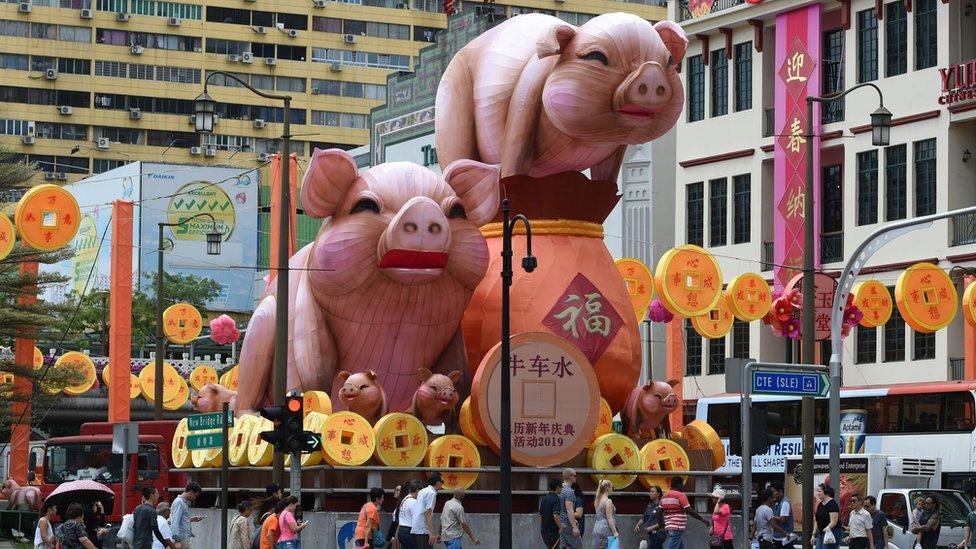
That's some pig! Celebrations are under way in Chinatown, Singapore
Each animal of the Chinese zodiac is believed to have its own unique traits and qualities. Those born in the year of the pig are said to be intelligent, compassionate and loyal.
Does it matter if one's zodiac animal isn't welcome?
"There's absolutely no reason to worry," said Kuala Lumpur-based Feng Shui consultant Joey Yap. He told the BBC there didn't seem to be any sensitivities around celebrations in Malaysia this year, compared to last.
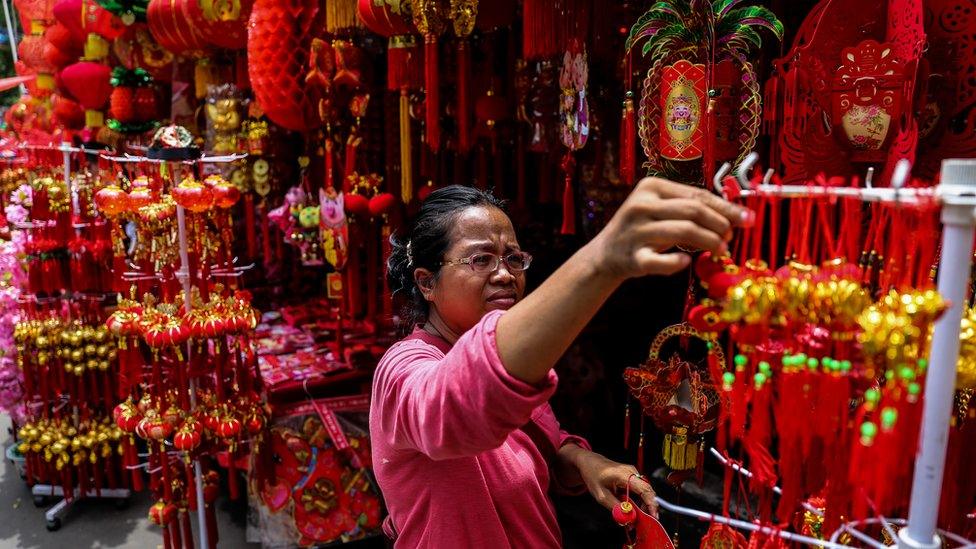
Red decorations galore in Jakarta's Chinatown
"Pigs will be fine," he said, adding that whether you display objects or not "does not affect one's personal luck".
"Colours, emblems; they all aren't important. In reality, one's luck all boils down to one's actions, so embrace positivity," he said.
'The first pigs Muslims can eat'
Even though it's the world's most populous Muslim nation, the lunar new year is a national holiday in Indonesia. Public celebrations are widely accepted - lanterns, colourful parades and performances are often seen in many cities.
Merry Olivia in Jakarta said her Muslim friends welcomed the image of pigs.

Baker Valeria Rita says her special cookies were a holiday hit with Muslim customers
"I grew up with many Indonesian Muslims so I know pigs will not make them feel uneasy," she said, adding that the creatures looked more "festive" than other zodiac animals.
"If you compare pigs with snakes, pigs are more adorable so people would rather buy decorations embellished with them. Not many people in Jakarta like snakes."
Baker Valeria Rita was rolling out special treats in time for the new year: pig shaped cookies with sweet pineapple jam fillings.
She said the response had been really good. "Orange or tangerine is a popular symbol for the lunar new year. This year, we decided to create pig-shaped treats and the quota for pre-orders was full within two weeks."
Many of her customers are also Muslim.
"They buy my cookies for Chinese colleagues and friends who celebrate the holiday. Some also order for themselves because they like the pigs," she said, sharing a joke made by her best friend, also a Muslim. "My goodies were the first pigs Muslims are allowed to eat."
'I don't want to offend'
But it's a different situation for 24-year-old Rangga Sastrajaya, from Bogor city. He bought pig toys and decorations but remains cautious in displaying them openly as he feels many Indonesians still do not accept cultural diversity.
"I could wear pig shirts or display pig-themed decorations at home but I will be quite careful in showing them off in public because I do not want to offend anyone," he admitted.
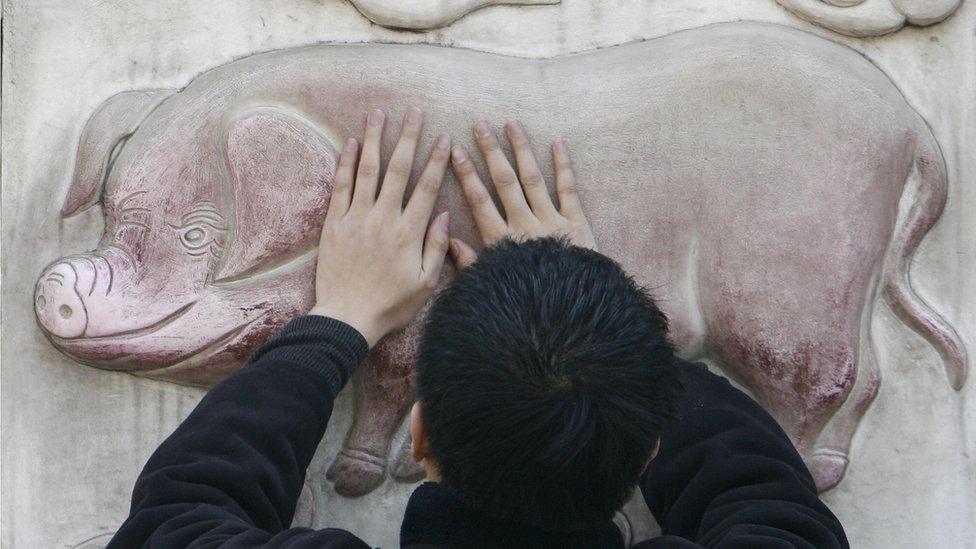
Will the new year spirit provoke widespread resentment among conservative Muslims?
But there are those who condemn the festivities. Forum Muslim Bogor (FMB), a conservative Islamic organisation in West Java, released a letter demanding the cancellation of festivities. They said it was "inappropriate" for Muslims because it could "undermine Islamic faith".
Their actions follow other groups like Pemuda Pancasila (PP) and the Malayan Persatuan Forum Komunikasi Pemuda Melayu (PFKPM), who previously condemned the celebrations by Chinese communities.

In 2017 Chinese-Christian Jakarta governor Basuki Tjahaja Purnama was jailed for blasphemy against Islam
Analyst Thung Ju-Lan from the Indonesian Institute of Science considers such sentiments the "impact of intolerant and political narratives", the same kind which rocked Jakarta two years ago.
Massive protests took place against former governor Basuki "Ahok" Tjahaja Purnama, a Christian of Chinese descent who was found guilty of blasphemy - a trial seen as a test of Indonesia's religious tolerance.
"It is the impact of the gubernatorial election in Jakarta, in Ahok's case. The same sentiment has been spreading," she told the BBC.
"The problem of intolerance continues because we have narrow understandings of what is actually happening. The more we do not understand, the more intolerant we are."
In the case of celebrating the lunar new year, many Indonesian Muslims feel it is "more religious than cultural".
But one politician has spoken out in defence of the Chinese community. Religious Affairs Minister Lukman Hakim Saifuddin encouraged beliefs of people from different cultures, faiths, and traditions to be respected.
"Regardless of what people understand about such celebrations, I invite all to respect tradition," he said.
Reporting by BBC News's Heather Chen in Singapore and BBC Indonesia's Christine Franciska and Ayomi Amindoni in Jakarta.
- Published19 October 2016

- Published22 January 2019

- Published16 March 2017
